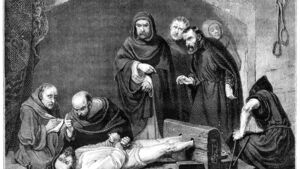Living Greener: Myth that past generations were inferior to modern world

A scene of an inquisition created by M. Robert Fleury
WHENEVER I criticise our modern consumer culture or show respect for the close communities people once had, I get a lot of hostile reactions.
I get it – people used to be poorer, and now they can take a holiday to Majorca.
In many ways, life is better. I get that.
What I find fascinating, though, is how powerfully people insist that everything today must be better than it was for our forebears, that everyone in the past was bigoted or stupid or unhappy.
Today we are hyper-sensitive to white supremacy, yet modern people show an even more radical and sweeping temporal supremacy, the belief that all the generations before us were inferior in every way.
Ask the average modern person about life in the Middle Ages, and you get a few stock facts that everyone knows.
No one bathed. Everyone threw waste into the street. No one could read. They thought the world was flat. The Spanish Inquisition burned witches. The Catholic Church stamped out learning. Rulers used barbaric torture devices like the Iron Maiden. Even certain musical chords were banned as Satanic.
Of course, the Middle Ages saw a great deal of turmoil, from barbarian invasions to plagues, but we lump these things together in our minds into a single moment, forgetting that they took place over a thousand years.
It would be like thinking of the Holocaust, the atom bombing of Hiroshima, the genocides of Stalin and Mao and the September 11 attacks as all taking place in a single year, to the same people.
Most of what we believe are exaggerations. We have many records and illustrations of people bathing throughout the Middle Ages.
Cities like London had regulations against throwing waste into streets, and harsh penalties for offenders. About half the population could read and write, wrote Seb Falk in ***The Light Ages***.
Medieval people knew the world was round long before Columbus, and no chords were ever banned. Most of the torture devices we now see in museums were made up centuries later to wow the tourists.
Not only did the Church never stamp out learning, but it kept the literature of the Greeks and Romans alive, mostly in Ireland and a few other places.
They actively taught them to students, sometimes including girls, leading to the first universities.
We think of the inquisition as the ultimate byword for fundamentalist tyranny, but – aside from the fact that they appeared after the Middle Ages, in the Renaissance – they were a much more rational and tolerant organisation than we imagine.
They were the court system of the Spanish Empire, and most of the cases they tried were for real crimes, like murder or robbery.
They allowed accused thirty days to prepare a defence, they allowed prosecuting and defence arguments, they allowed alibis and character witnesses.
They stopped a great deal of witch hysteria; when someone was accused of witchcraft, they demanded evidence.
They acquitted most people who came before them or gave only light punishments.
If we divide their total number of executions by the years they operated, they actually executed fewer people per year on average than the state of Texas does today, even adjusting for population.
We could take similar myths in every other era up to our own. Feminists didn’t burn any bras in the 1960s; that was an urban legend.
Few or no people panicked during the War of the Worlds broadcast in 1938. Stockbrokers didn’t actually jump out of windows when the Great Depression hit. There were few bloody gunfights in the Old West. Turns out, people in any era just aren’t that stupid.
Of course, one can cite many examples of injustice in the past, for the past outnumbers the present by something like a million to one, and injustice is by definition what history records. If it’s not tragic, we don’t hear about it.
Yet most people’s lives, most of the time, don’t consist of death and violence any more than our lives do – if they had, our species would never have survived. “Civilization is a stream with banks,” historian Will Durant once said. “The stream is sometimes filled with blood from people killing, stealing, shouting and doing the things historians usually record, while on the banks, unnoticed, people build homes, make love, raise children, sing songs, write poetry and even whittle statues. The story of civilization is the story of what happened on the banks. Historians ... ignore the banks for the river.”





